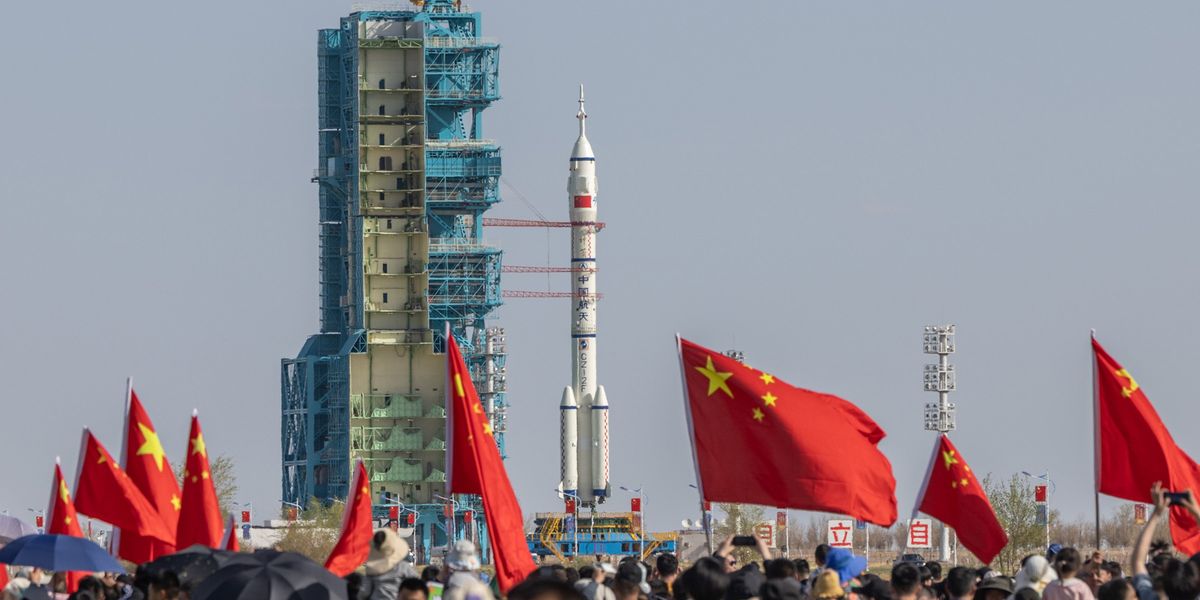A curious feature of American life is the belief that putting a man on the moon in 1969 was not merely a thing we did, but a thing that defined who we are. The moon landing became the fixed point in a national narrative of progress, the ultimate rebuttal to any subsequent doubt. If we can put a man on the moon, the refrain went, we can do any lesser thing. It was a statement of faith in a particular kind of American power, the fusion of technological genius and free-enterprise grit that could, it seemed, bend the arc of history. The phrase has since acquired a certain nostalgic patina, a relic from an era when the country could still muster that kind of singular, massive effort.
Now, the proposition is being tested.
The question of whether China will beat the United States back to the lunar surface is, on one level, a technical one, a ledger of rocket tests and budget allocations. Yet to frame it this way is to miss the point. The competition is not about launch windows or payload capacities but about the story America tells itself. A Chinese flag planted in the regolith of the lunar south pole before an American one would do more than mark a geopolitical achievement; it would be a blow to perceptions of American exceptionalism. The old refrain would hang in the air, suddenly hollow.
We are witnessing the formation of two distinct camps, exporting earthly rivalries to space.
The American effort, named Artemis after Apollo’s twin sister, is a program freighted with legacy and ambition. It relies on the Space Launch System, a behemoth of a rocket that flew a successful uncrewed test in 2022, but also shed foam insulation on its way up, a disquieting echo of the Columbia disaster. For the actual landing, NASA has outsourced the task to SpaceX, whose Starship is a fully reusable silver ship promising fantastically to deliver, not just astronauts, but the entire infrastructure of a settlement. It is a characteristically American bet on the power of the private sector, a leap of faith that has yet to achieve, as of mid-2025, a successful orbital flight. The official timeline for an American return has slipped from 2024 to 2026, and now, in the quiet admissions of internal reviews, to 2027, at the earliest.
China, meanwhile, proceeds with the calm of a nation that confidently measures progress in five-year plans. Its program lacks a poetic name but possesses an observable momentum. The hardware has a familiar, almost classical design: a Long March 10 rocket, a crew capsule named Mengzhou (“Dream Vessel”), and a lander called Lanyue (“Embracing the Moon”). The architecture is a direct echo of Apollo: a two-part lander with a command module in orbit. It is a repetition of a proven method, not a reinvention of it. While NASA contends with the uncertainties of Starship, China has been methodically hitting its marks. In August 2025, engineers successfully test-fired the first stage of its new rocket and simulated a lunar landing by hanging a 26-ton prototype from a crane. Its stated goal is to land taikonauts on the moon before 2030. At the current pace, they are likely to succeed.
This divergence in approach is telling. The United States is trying to innovate its way back to the moon, to do something bigger and more sustainable than before. China is simply trying to get there. One could argue this reflects a difference in governance models: the chaotic, brilliant, and often inconsistent engine of America versus the focused, centralized will of the Chinese state. While NASA’s budget is subject to the whims of Congress and shifting presidential priorities, a cycle of grand announcements and quiet cancellations that has plagued the agency for decades, China’s space program is integrated with its national and military ambitions, backed by pockets of undisclosed depth.
RELATED: China built a solar-powered back door into millions of American homes
Photo by Buddhika Weerasinghe / Contributor via Getty Images
The geopolitical stakes extend beyond mere prestige. Both nations are aiming for the lunar south pole, where permanently shadowed craters are believed to hold vast quantities of water ice, the key resource for any sustained presence on the moon. The United States has attempted to shape the norms of this new frontier through the Artemis Accords, a set of principles for peaceful lunar exploration signed by over 35 nations. China and Russia are conspicuously absent, instead promoting their own coalition around an International Lunar Research Station. We are witnessing the formation of two distinct camps, exporting earthly rivalries to space. The nation that arrives first will not own the territory (the 1967 Outer Space Treaty forbids it), but it will enjoy the advantage of being there, setting precedents and controlling the most valuable real estate.
There are those who see a silver lining in this scenario. A Chinese landing could serve as a “Sputnik moment,” shocking the United States out of its complacency and galvanizing a new era of investment and innovation. It’s also possible that being second, but arriving with the revolutionary capability of Starship, could prove to be the more significant achievement in the long run. History may judge the establishment of a true lunar outpost as more important than the planting of the next flag.
Yet, the symbolism of that first footprint remains potent. For over half a century, the moon has belonged, in the popular imagination, to America. It was our “can-do” spirit made manifest. To see another nation achieve what we have struggled to repeat would be to confront a fundamental shift in the global order. It would suggest that the future is no longer a chiefly American enterprise. The race to the moon was never just about the moon. It was, and is, about the terrestrial anxieties and ambitions of the nations doing the racing. As we watch the trajectories of these two great powers, it is difficult to avoid the sense that we are witnessing not just the dawn of a new space age, but the twilight of an old one.
Read the full article here






![Democrat Rep. Admits His Party Was Afraid of the Teachers Union [WATCH] Democrat Rep. Admits His Party Was Afraid of the Teachers Union [WATCH]](https://www.lifezette.com/wp-content/uploads/2025/09/2025.09.03-10.32-lifezette-68b819202df2f.jpg)
![J6 Pipe Bomb Arrest Sparks New Questions About FBI’s Five-Year Failure [WATCH] J6 Pipe Bomb Arrest Sparks New Questions About FBI’s Five-Year Failure [WATCH]](https://www.lifezette.com/wp-content/uploads/2025/12/2025.12.08-11.16-lifezette-6936b3755257b.jpg)

![Scott Bessent Goes ‘Quiet Assassin’ Mode on CBS’s Margaret Brennan [WATCH] Scott Bessent Goes ‘Quiet Assassin’ Mode on CBS’s Margaret Brennan [WATCH]](https://www.lifezette.com/wp-content/uploads/2025/04/2025.04.28-11.51-lifezette-680f6bcf6a72b.jpg)


![Deputy ICE Director Asks the Question Democrats Can’t Answer About Criminal Illegal Aliens [WATCH] Deputy ICE Director Asks the Question Democrats Can’t Answer About Criminal Illegal Aliens [WATCH]](https://www.lifezette.com/wp-content/uploads/2025/12/2025.12.07-08.50-lifezette-6935e899c0468.jpg)